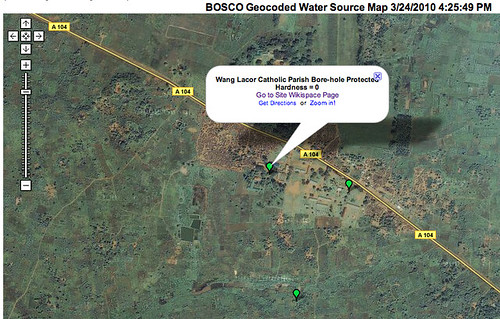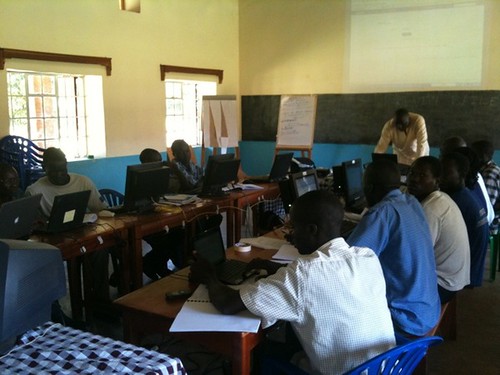Arch Bishop John Baptist Odama speech at the Breaking Borders Award
1 comments Posted by aliker david martin at 2:11 PM Jokondino Okema of Pagak, working with students from Lacor, has begun to implement the water source mapping project. Each of the points on the map contains the results of a proof-of-concept water quality test, and a hyperlink to images and additional information about the water source. Students and teachers use GPS units to obtain longitude and latitude information. The location and water quality data are entered into a Google form embedded in a wiki page, which is automatically mapped each evening through mapalist.com. This technology is teacher-friendly: the hope is that teachers will be able to create their own mapping projects using this same technology.
Jokondino Okema of Pagak, working with students from Lacor, has begun to implement the water source mapping project. Each of the points on the map contains the results of a proof-of-concept water quality test, and a hyperlink to images and additional information about the water source. Students and teachers use GPS units to obtain longitude and latitude information. The location and water quality data are entered into a Google form embedded in a wiki page, which is automatically mapped each evening through mapalist.com. This technology is teacher-friendly: the hope is that teachers will be able to create their own mapping projects using this same technology.
As partners of Voices of Africa, who recently won the World Bank Innovation Fair challenge, we will be heading to South Africa (albeit virtually) to mingle with other ICT/ICT4D experts!
Labels: ICT, ICT4D, World Bank
Over at Project Diaspora, TMS Ruge responds to challenges from OLPC. A lot of what he says in this post makes me think of BOSCO-Uganda (as it is now and also where we want to see it go). I think a central question to the OLPC debate, as well as to the rampant spread of telecenters, is: "How do we provide technology while also offering value-add training that teaches a responsible and engaging use of technology over and above the basics?" Read more here.

Labels: C2C, Classroom to Classroom, GPS, Gulu, Uganda
It looks like I have some very big shoes to fill. The Bye Bye Bailey post made me realize how much Kevin has contributed over the years and become a part of the family. I hope I can offer a smalll slice of what he has!
I will join the BOSCO team in mid-March. With skills primarily rooted in journalism and communications, I look forward to building BOSCO's reputation and scope, as well as helping partner centers spread the word about their work.
More information on myself can be found on my blog and website. Kevin has been beyond helpful in helping me prepare and I can't wait to hit the ground running!
Unicef Madagascar visits BOSCO to learn how to replicate our success in rural connectivity
0 comments Posted by Kevin Bailey at 2:49 PMBOSCO hosted staff from Unicef Madagascar today who were on a visit to assess rural connectivity solutions that are being implemented in Uganda in hopes of replicating these solutions back in Madagascar. BOSCO connects schools, community centers, health clinics, and CBO/NGO outstations in rural areas to a network of high speed Internet that is transmitted via long-range WiFi. We also implement the use of solar panels to power low-power PCs at each of our sites.
Unicef Madagascar hopes to return to Madagascar and implement some of the same rural connectivity solutions that are already underway in BOSCO's network. BOSCO is continuing to work with Unicef Uganda to finalize a 2-year partnership that will allow BOSCO to double its network presence across northern Uganda, including entering Kitgum and Pader Districts to the East. BOSCO is proud to work in partnership with multinational organizations like Unicef who have the capacity to take best practices in rural connectivity and make them widely available in new locations.
David Aliker and Stella Akiteng, both Project Coordinators for BOSCO-Uganda, accompanied Unicef representatives from the Gulu zonal office to visit a number of our BOSCO sites today, including, Lacor, Pagak, Pabo, Coope, and Unyama (see our site map here).
We are just winding up our smale scale funding project with Unicef. Most of the project was geared toward adding a few new sites to our network and implementing, for the first time, our grass-roots Web 2.0 training program at each site. In this program, youth at each site learn to train each other to use valuable collaboration tools on the web, including: email, Wikispaces, blogging, and other social media.
This week, BOSCO is hosting our first ever Web 2.0 training workshop, on site at our office in the Catechists Training Center, Gulu. We are hosting 16 young men and women representing 8 of our rural sites (see site locations here).
They are going to be focusing on learning collaborative, web based applications like Wikispaces, Google Docs, and other social media applications. Our users have already learned how to create their own blogs. You can see their work here.
Upon completion of the workshop these users will return to their rural based ICT sites and will be the primary peer trainers, initiating the Train the Trainer process.
Labels: BOSCO-Uganda, Gulu, ICT, Uganda, Web 2.0
Please take 30 seconds to vote for BOSCO, a finalist for a $20K Better World Books' Readers Choice Literacy Grant: http://www.betterworldbooks.com/voting.aspx. Vote by Jan 20th! Thanks to Paul Miller at Better World Books for alerting BOSCO to this opportunity!













